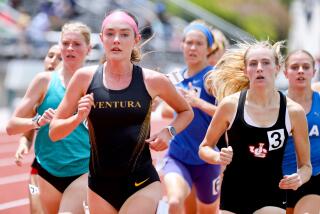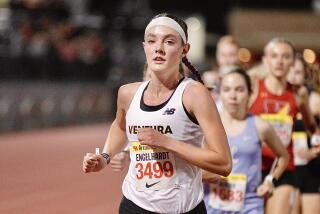UCI’s Akraka Must Clear Unexpected Hurdles to Make NCAAs
- Share via
The Track and Field News has spoken and the bible of the stopwatch-and-decimal set has predicted a 1991 NCAA championship in the 800 meters for Maria Akraka, Sweden’s great gift to the scenery at UC Irvine.
This is known as going out on a limb, provided the limb is as wide as the 405 Freeway. Akraka, four times the Swedish national champion, has a personal best of 2:01.67 in the 800--more than two seconds faster than the best mark run in the NCAA this year.
Eugene, Ore., should be no problem, except for one problem.
In order to win the NCAAs, Akraka first has to qualify for them. Akraka hasn’t yet and now she’s running against the clock--16 days and counting--and it’s all because someone switched the rules on her.
Since when, Akraka wants to know, did the half-mile become a hurdles event?
The obstacles keep lining up, continuing to block her path. At last month’s Mt. SAC relays, Akraka tripped over a competitor’s ankle during a traffic jam at the 90-meter mark, fell, got back up and finished the race under 2.05.50, the NCAA qualifying time. She also finished ninth and the meet’s AccuTrack timing system malfunctioned after eight runners crossed the finish line, rendering Akraka’s time unofficial, and, therefore, invalid.
Saturday, at the Big West track and field championships at UC Irvine, Akraka tried again. First, however, she had to run 1,500 meters. Then, 50 minutes later, she ran 900 meters. Yes, 900. An “unfair start” halted Akraka and the pack after 100 meters, forcing a second start and a second race. Once more, the trouble was with the timing system, which heretofore will be advertised and sold as Not-So-AccuTrack.
Second time around, a fair start, but not a fair competition. The field was slow, too slow to push Akraka much longer than the smoke from the starter’s gun lingered in the air.
Akraka blitzed the field, winning by 4 1/2 seconds, but the magic number remained unscathed. Looking over her shoulder, the lights on the Anteater Stadium scoreboard mocked her.
2:06.33.
“Too slow, too slow,” Akraka groaned as she lay on the grass, trying to recapture her breath. Minutes passed and she finally sat up, greeting congratulatory handshakes with a forced smile.
“Great job,” a friend told Akraka.
“Not that great,” Akraka corrected.
Akraka rewound the race in her mind and decided the false start had a negligible effect. “You can’t blame it on that,” she said.
How about running the 1,500 meters less than an hour before the 800?
Now that you mention it. . . .
“I’ve never run the 1,500 and the 800 so close together before,” she said. “I was a bit tired from the 1,500. And it was such a slow pace, I had a hard time picking it up again for the 800. . . .
“Maybe it would have been better running the shorter race first. If I’d gone from, say, 400 meters to 800 meters, it wouldn’t have been so bad. I still would have had speed in my legs. But the 1,500 did make my legs feel a bit like jelly.”
In the parlance of another sport, Akraka took one for the team Saturday. She is a half-mile specialist--it is the event that will probably pay her way to Barcelona in 1992--and before the Big West meet, she had competed in the 1,500 meters for Irvine precisely once, almost on a whim. A blockbuster of a whim, perhaps--Akraka beat Buffy Rabbitt, the Anteaters’ All-American miler, by more than 14 seconds--but a whim nonetheless.
This weekend, Irvine had a Big West championship to win, which would have been a first for the Anteater women. As he added up the points it would take to run down Fresno State, Irvine Coach Vince O’Boyle decided to add Akraka to his 1,500-meter roster--”a team decision,” is how he worded it.
Akraka got Irvine its points, but Fresno State retained its title and Akraka failed at Job One--booking Eugene. Akraka visited the victory stand twice, but all in all, it was little more than a lost afternoon.
What now?
“I don’t know if I have any chances left,” Akraka said. “I have two weeks to qualify, but I don’t even know if there are any more meets I can enter. There must be one, I hope.”
There is.
“She doesn’t know it yet,” O’Boyle said, “but we’re going to enter her next week in the Santa Monica Distance Carnival, just in the 800. To qualify in the 800, you really have to push yourself. We’ll do whatever we can--we’ll get a rabbit to run with her and lead her out.”
That’s rabbit, as in a fast-breaking runner sacrificed for the purpose of setting a quick pace, not necessarily Rabbitt.
O’Boyle figures it’s the least he can do for Akraka. She was born in England, raised in Stockholm and is expected to compete for Sweden in the ’92 Olympics, but she ran her last collegiate season at Irvine--in exchange for half a scholarship.
“She’s not on a full ride,” said O’Boyle, almost too embarrassed to admit it. “We’re helping her, but when you have 3 1/2 scholarships for your women’s track team, your resources are limited.
“She’s as good an athlete as I have coached. I’d put her right there with Ruth Wysocki--and Wysocki ran a four-flat (4:00.18 in the 1,500 meters). . . . She helped us place third in the nation at the Penn Relays; she’s given our program a lot of visibility.”
O’Boyle grins.
“Let’s say we’re getting a lot for what we’re giving her.”
At the moment, Akraka’s wish list is down to one--a lane with her name at the NCAAs.
She reads the Track and Field News.
She has seen the prediction.
She agrees with it. . . .
”. . . If I qualify ,” she said. “The fastest time this year is 2.04. Edith Nakiying of Iowa State ran it. She was the fastest and that’s not so fast.
“I can do it, if I qualify. If I can get my head together.”
And, if someone takes the hurdles down.
More to Read
Go beyond the scoreboard
Get the latest on L.A.'s teams in the daily Sports Report newsletter.
You may occasionally receive promotional content from the Los Angeles Times.










